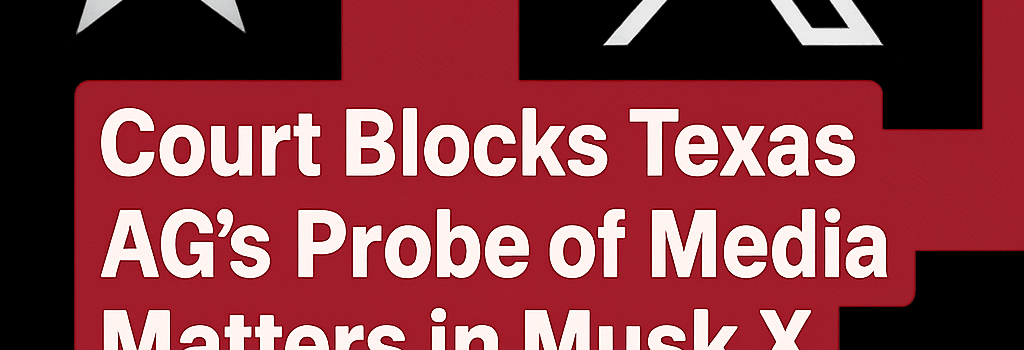Court Blocks Texas AG’s Probe of Media Matters in Musk X Ad Boycott

Background: Free Speech Versus State Enforcement
On May 30, 2025, a three-judge panel of the US Court of Appeals for the District of Columbia Circuit unanimously declined to lift a preliminary injunction that prevents Texas Attorney General Ken Paxton from using civil investigative demands (CIDs) to probe Media Matters for America (MMFA). The probe was launched one day after Elon Musk’s social media company X sued MMFA over a report alleging antisemitic content appearing adjacent to major-brand advertisements, which X said triggered an advertiser boycott.
Appeals Court Decision: Legal Reasoning and First Amendment Protections
- Judge Harry T. Edwards’s opinion emphasized that MMFA has standing under the First Amendment “because they are the targeted victims of a campaign of retaliation” for protected speech.
- Edwards noted “ample evidence” that Paxton launched the CID “in bad faith,” citing Paxton’s own press release tying the probe to X’s lawsuit.
“The First Amendment generally prohibits government officials from subjecting individuals to retaliatory actions after the fact for having engaged in protected speech.”
- The court found no evidence supporting Paxton’s claim that MMFA’s reporting was “designed to mislead consumers” about X’s ad metrics.
Technical Deep Dive: Civil Investigative Demands Under Texas Law
Under Tex. Bus. & Comm. Code § 17.47, the Attorney General can issue CIDs to investigate “unfair or deceptive acts or practices.” These demands require detailed documentation, including:
- Internal communications, including emails and chat logs (e.g., Slack, Microsoft Teams) dating back to January 1, 2022.
- Data analytics reports on ad performance, click-through rates (CTRs), and demographic targeting metrics.
- Funding source disclosures, including grants from foundations or political action committees.
CIDs carry potential penalties up to $10,000 per violation for noncompliance, plus contempt fines or even criminal sanctions if evidence is destroyed.
Additional Analysis: Impact on Ad Tech Governance
Experts warn this case may set a precedent for state-level enforcement actions against digital platforms and watchdog groups. Dr. Sasha Thompson, cybersecurity policy analyst at the Brookings Institution, notes:
“Allowing AGs to weaponize trade-law investigations in response to unfavorable reporting risks chilling investigative journalism and could interfere with ad tech transparency frameworks such as the IAB’s OpenRTB specifications.”
She adds that platforms may react by increasing automated content moderation or shifting high-value ad inventory to walled gardens, reducing open web ad spend by up to 15% in 2025.
Expert Opinions on First Amendment Implications
- Constitutional Law Prof. Laura Nguyen (NYU): “This decision reaffirms that government officials cannot cross the line from legitimate law enforcement into using their power to silence critics.”
- Free Speech Advocate Matt Cagle (ACLU of Northern California): “The court correctly identified that the threat of penalties—civil or criminal—is itself a form of intimidation that chills speech.”
Latest Developments and Related Litigation
Since the appeals court’s ruling, MMFA has continued parallel actions:
- An ongoing lawsuit with the FTC investigating X’s ad placement algorithms for potential deceptive practices under Section 5 of the FTC Act.
- Coordination with other states—Missouri’s AG Andrew Bailey faces a similar injunction after his broad CID was enjoined in August 2024.
- New disclosures show X tested machine-learning classifiers to automatically flag extremist content, raising questions about algorithmic fairness and bias.
Implications for Stakeholders
If Paxton’s probe were allowed to proceed, MMFA could face:
- Civil penalties up to $10,000 per document or request ignored.
- Forced disclosure of proprietary data-sharing agreements with research partners.
- Further chilling of investigative reporting on platform governance and ad tech operations.
The appeals court’s injunction preserves MMFA’s ability to contest the CID on constitutional grounds, highlighting a growing tension between state enforcement powers and digital civil liberties.
Conclusion: A Win for Watchdogs and Journalistic Freedom
Armed with the appeals court’s decision, MMFA’s President Angelo Carusone hailed the outcome as a “victory for free speech.” He criticized Musk’s call for a “thermonuclear” legal strategy, stating it was “an unprecedented attempt to use state power to silence critics.”
With this ruling, the legal community is watching closely to see whether similar probes will be halted or pursued, and how platforms will adapt their ad tech governance and compliance programs to navigate the evolving intersection of technology, policy, and First Amendment rights.